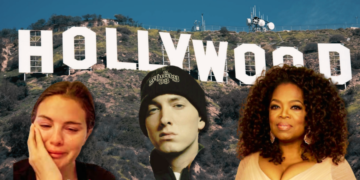For years, celebrities have acted as self-appointed moral arbiters, using their platforms to push progressive politics down the throats of everyday Americans.
It was the meltdown heard around the world. Selena Gomez, one of Hollywood’s biggest stars, recently broke down in tears over President Donald Trump’s immigration policies, which have led to mass deportations. In a heartfelt Instagram video, she lamented, “All my people are getting attacked, the children. I don’t understand.” Her emotional plea, deeply rooted in her Mexican heritage (she’s also half-Italian and born in the USA), underscores the personal connection many feel to these policies.
For years, celebrities have acted as self-appointed moral arbiters, using their platforms to push progressive politics down the throats of everyday Americans. They treated their fan bases as ideological foot soldiers, expecting them to obediently follow their lead. But in 2024, their power has finally waned. The MAGA movement has shattered the illusion that Hollywood endorsements matter. Voters simply don’t care what out-of-touch millionaires think.
Take the 2020 Golden Globes, when Ricky Gervais delivered a scathing takedown of virtue-signaling celebrities. “You know nothing about the real world,” he told them. And he was right. Fast forward to today, and the collapse of celebrity influence is evident in the spectacular failure of Kamala Harris’s campaign, despite the parade of A-listers and their endorsements. Michigan flipped red, Eminem’s credibility took a nosedive, and Oprah’s paid activism backfired spectacularly.
The billion-dollar campaign strategy of Kamala Harris relied heavily on the presence of celebrities at her rallies and events. The Democratic establishment believed that a star-studded presence would translate into votes, but they couldn’t have been more wrong. Americans saw through the gilded glitz and glamour, recognizing that these endorsements were nothing more than desperate attempts to manufacture popularity for an uninspiring candidate. The strategy flopped big time!
Worse than being ineffective, the celebrity endorsements actually harmed Harris’s image. It was almost comical watching someone like Eminem—who built his brand on anti-establishment rebellion—awkwardly endorse a woman who epitomized the Democratic elite.
The image of the “boy from the Detroit streets” standing beside the privileged political class of San Francisco was jarring. Instead of boosting Harris’s credibility, it tanked Eminem’s. Fans reminded him that the city he once represented—Detroit—was ravaged by the very policies Harris championed. Michigan turned red, proving just how out of touch these endorsements were.
And it wasn’t just Eminem. Oprah, once seen as a cultural kingmaker, found herself embroiled in controversy when it was revealed that her company had received a million dollars from the Kamala campaign ahead of an interview with the candidate. Her attempts at damage control fell flat. Rather than convincing voters, her endorsement exposed the corrupt underbelly of Democratic campaign tactics, reinforcing the idea that the entire operation was an elaborate money-making scheme. The era of Oprah’s political influence was officially over.
The same fate befell George Clooney, Taylor Swift, and other Hollywood figures who threw their weight behind the Democratic campaign. Clooney’s infamous op-ed urging Biden to step aside was meant to be a game-changing moment, but instead, it underscored the desperation of the left. Taylor Swift, despite her massive fan base, failed to move the needle politically. Her repeated political statements during her blockbuster tour were met with apathy at best and resentment at worst. The American public simply tuned out.
Meanwhile, Trump ignored Hollywood entirely and instead embraced independent media—podcasters, YouTubers, and grassroots influencers who actually connect with real voters. Unlike celebrities, these figures have built their followings organically, engaging with audiences in unfiltered, long-form conversations. Trump didn’t need a multi-billion-dollar campaign; he simply needed a microphone, a camera, and a message that resonated. Harris spent far more than he did.
From Joe Rogan to Dan Bongino, from Theo Von to Patrick Bet-David, Trump tapped into the real voices of America. These influencers weren’t parroting scripted talking points—they were asking real questions, challenging narratives, and engaging in the type of discussion that Hollywood elites couldn’t stomach. Their audiences weren’t passive consumers; they were engaged, informed voters. And the best part? It didn’t cost Trump’s campaign a dime.
How many unedited long-form conversations did Kamala Harris participate in? Zero. Even her inteview on the Call her Daddy podcast was under an hour. She hid behind scripted events and teleprompters while Trump embraced the future of political engagement. The contrast was stark.
The Democrats’ reliance on celebrity influence has been exposed as an outdated, ineffective strategy. The age of Hollywood kingmakers is over, and the left is struggling to adjust. The American people have made it clear: they don’t need political guidance from millionaire entertainers who are detached from their struggles.
Ricky Gervais was prophetic. No one cares about show business stars and their synthetic, rehearsed, and often nonsensical political opinions anymore. The spectacle of celebrities making tone-deaf political statements has become more of a punchline than a serious moment of activism.
In 2024, there is only one superstar commanding the public’s attention. And his name is Donald J. Trump. Welcome back, Mr. President!
George Harizanov is the CEO of the Institute for Right-Wing Policies in Sofia, Bulgaria. He posts on X @georgeharizanov
















